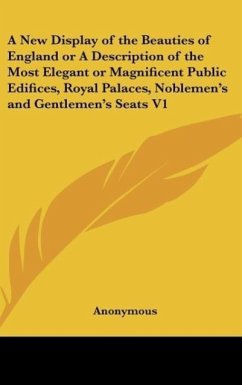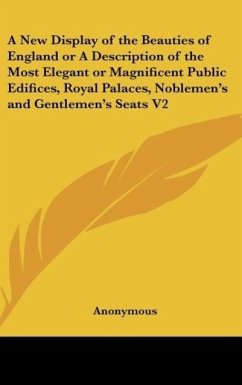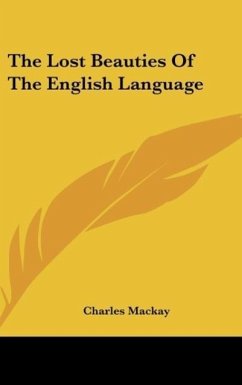
A New Display of the Beauties of England or A Description of the Most Elegant or Magnificent Public Edifices, Royal Palaces, Noblemen's and Gentlemen's Seats V1
Versandkostenfrei!
Versandfertig in 1-2 Wochen
41,99 €
inkl. MwSt.

PAYBACK Punkte
21 °P sammeln!
A New Display of the Beauties of England is a two-volume book that provides a detailed description of the most elegant and magnificent public edifices, royal palaces, noblemen's and gentlemen's seats in England. Written by an anonymous author, the book is a comprehensive guide for anyone interested in exploring the architectural and cultural heritage of England. The first volume covers the public edifices, including churches, cathedrals, and other important buildings, while the second volume focuses on the grand estates and homes of the nobility and gentry. The book is richly illustrated with ...
A New Display of the Beauties of England is a two-volume book that provides a detailed description of the most elegant and magnificent public edifices, royal palaces, noblemen's and gentlemen's seats in England. Written by an anonymous author, the book is a comprehensive guide for anyone interested in exploring the architectural and cultural heritage of England. The first volume covers the public edifices, including churches, cathedrals, and other important buildings, while the second volume focuses on the grand estates and homes of the nobility and gentry. The book is richly illustrated with engravings and maps, making it a valuable resource for scholars, historians, and anyone interested in the history and culture of England. Overall, A New Display of the Beauties of England is a fascinating and informative book that provides a unique insight into the country's architectural and cultural heritage.1776. Volume 1 of 2. And other curiosities, natural or artificial, in the different parts of the Kingdom. Adorned with a variety of copperplate cuts, neatly engraved. The first volume is mainly concerned with the most elegant and magnificent edifices, palaces and seats to be found within a 20-mile radius of London. In the second volume, which covers the more remote parts of the Kingdom, the places described have been exactly classed under their respective Counties. Other volumes in this set are ISBN(s): 1417917148.This scarce antiquarian book is a facsimile reprint of the old original and may contain some imperfections such as library marks and notations. Because we believe this work is culturally important, we have made it available as part of our commitment for protecting, preserving, and promoting the world's literature in affordable, high quality, modern editions, that are true to their original work.












